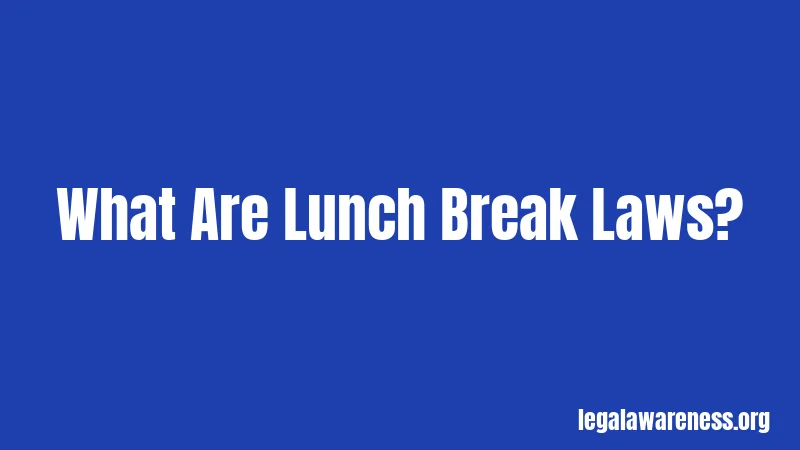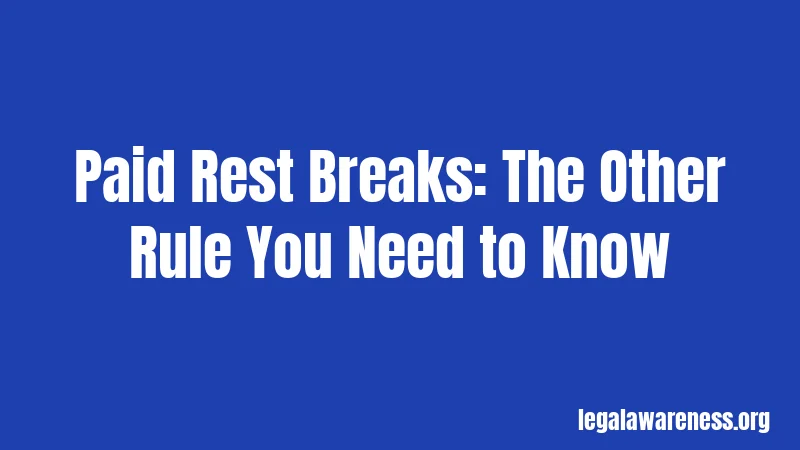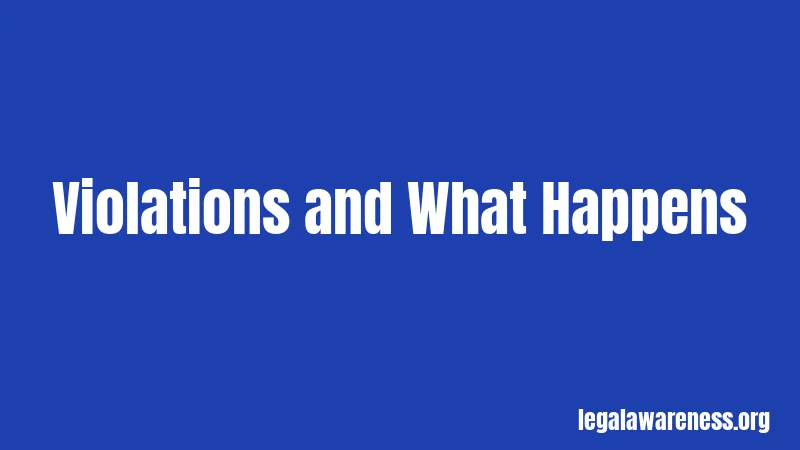New York Lunch Break Laws (2026): Your Employee Rights Explained
Most employees have no idea how strict New York’s lunch break laws actually are. Seriously. Your employer can’t just skip your break to save time. In New York, meal and rest break laws are detailed and real. Breaking them can cost your employer big time.
Here’s what you need to know. We’re going to walk through exactly what your rights are. You’ll learn what your employer must provide. You’ll also discover what to do if your breaks aren’t protected.
What Are Lunch Break Laws?

Okay, let’s start simple. Lunch break laws are rules that protect workers. They ensure you get time to eat and rest during your workday. Think of them like a legal promise from your employer.
In New York, these laws are pretty straightforward. They say employees deserve unpaid meal breaks. Employers also have to give paid rest periods. Sound complicated? It’s actually not once you break it down.
These laws exist for a reason. Workers need time to recharge. You need to eat. You deserve to step away from your job for a bit. That’s not asking too much—that’s basic fairness.
New York’s Basic Meal Break Rules
How Long Is Your Break?
Here’s where it gets specific. In New York, employees working six or more hours must get a 30-minute unpaid meal break. That’s the baseline rule. Pretty straightforward, right?
But wait—there’s more detail. The break should come before the end of your sixth hour of work. So if you start at 9 a.m., your meal break should happen by 3 p.m. Your employer can’t make you wait until 5 p.m. to eat.
Wondering if this applies to you? If you work six hours or more in a day in New York, yes. This covers most workers. From retail employees to office workers, this rule applies.
When Must You Get Your Break?
Timing matters here. Your employer has to give you this meal break sometime during your shift. They can’t schedule it at the very beginning or very end of your day. You need reasonable access to actually use it.
Honestly, this is the part most employers get right. Many give breaks around noon or mid-shift. That’s the practical approach most companies take.
The law is flexible about the exact timing. Your employer decides when to schedule it. But they can’t be unreasonable. If you work 9 a.m. to 4 p.m., you need a break during that time. Not after.
Is Your Meal Break Paid or Unpaid?
Here’s an important detail. Your 30-minute meal break is unpaid. That means your employer doesn’t have to pay you for that time. You’re off the clock. That’s standard across New York.
But here’s the catch—if your employer requires you to stay on the premises, things get tricky. If you can’t actually leave or have to stay near your work, the rules change. Your employer might owe you compensation for that time. More on that in a moment.
Paid Rest Breaks: The Other Rule You Need to Know

Hold on, this part is important. New York also requires paid rest breaks. These are different from meal breaks. Rest breaks are shorter and they’re paid.
Here’s how it works. For employees working more than four hours, New York requires at least one paid rest break. It should be five to ten minutes. You get this in addition to your meal break.
So let’s say you work eight hours. You should get: one 30-minute unpaid meal break AND one paid rest break of five to ten minutes. That’s basic protection for workers.
Your employer must pay you for rest breaks. This time counts toward your wages. Think of it like a legal pause built into your workday. It’s a small thing, but it matters.
Special Circumstances and Exceptions
What if You Work in a Factory or Manufacturing?
Manufacturing workers get different rules. Honestly, factory workers got special protections years ago. The laws are a bit more detailed for them.
Factory employees working more than six hours must get two 15-minute paid rest breaks. These breaks must happen before the meal break and after the meal break. Basically, you’re protected throughout your shift.
If a factory worker skips a rest break, the employer might owe them extra pay. Some employers have to pay overtime or additional compensation if breaks aren’t provided. It varies based on the specific situation.
Not sure if this applies to you? If you work in manufacturing, food processing, or factory production, ask your HR department. These rules are designed for your specific work situation.
What About Employees Who Can’t Leave Their Workplace?
Now here’s where things get interesting. Some jobs require you to stay on the job during breaks. Think security guards or store managers who need to watch the place.
If your employer requires you to stay on premises during your meal break, the legal picture changes. You might be entitled to paid time for that break. It’s not a free break anymore—it’s controlled time.
A friend asked me about this recently. She was a manager required to stay in the store during breaks. Turns out, her employer owed her compensation for that time. Don’t assume your employer is following the rules here.
What if You Work Less Than Six Hours?
You’re not forgotten. If you work fewer than six hours, the rules are different. You don’t automatically get a meal break. New York law doesn’t require it for shorter shifts.
However—and this is important—your employer can’t prevent you from taking a break if you request one. You have the right to eat and use the bathroom. Your employer just doesn’t have to schedule it or pay for it.
Makes sense, right? Short shifts are handled differently because you’re not there that long.
Violations and What Happens

What If Your Employer Denies Your Break?
If your employer doesn’t give you the required meal break, that’s a violation. You have rights here. Denying breaks is against New York labor law.
The consequences can be serious for your employer. They can face penalties from the New York Department of Labor. They might also owe you compensation for missed breaks.
More specifically, some employers have to pay you for the break time they denied. It’s like they’re compensating you for the lost rest. The amount depends on your wages and the situation.
How Much Can Your Employer Be Fined?
Here’s where it gets serious for employers. Violating meal break laws can result in fines. The New York Department of Labor takes these violations seriously.
Fines can range significantly depending on the violation type and frequency. A first violation might result in a warning or smaller fine. Repeated violations increase penalties. Some fines can reach thousands of dollars per violation.
Your employer might also face civil penalties if they’re sued. Employees can sometimes bring lawsuits for unpaid break time. This is less common, but it happens.
Stay with me here. The point is that your employer has real incentive to follow the rules. Protecting your breaks protects them legally.
Can You Be Punished for Reporting a Violation?
Absolutely not. That would be retaliation. New York protects employees who report meal break violations.
If you report your employer to the Department of Labor and they punish you, that’s a separate violation. You can’t be fired, demoted, or treated poorly for standing up for your rights.
This protection is important. You shouldn’t fear consequences for reporting illegal behavior. That’s what the law is designed to prevent.
How to Make Sure Your Rights Are Protected
Documenting Your Breaks
Start keeping track of your breaks. Write down when you take them. Note if you’re denied breaks or forced to skip them.
This documentation becomes crucial if there’s a dispute later. You’ll have evidence of what actually happened. It’s simple but powerful.
You don’t need fancy records. A note in your phone works. Just jot down the date and whether you got your break. That’s enough.
Speaking With Your Employer
Before escalating, talk to your manager or HR. Sometimes it’s a genuine mistake. They might not realize they’re violating the law.
A conversation might solve the problem quickly. Many employers want to follow the rules once they understand them. Give them a chance to correct it.
Be professional and factual. Say something like: “I’ve noticed I’m not getting my scheduled meal break. I know New York law requires this. Can we fix this?” Simple and clear.
Contacting the Department of Labor
If talking doesn’t work, you can file a complaint. The New York Department of Labor investigates meal break violations.
You can file a complaint online or by phone. The Department of Labor takes these complaints seriously. They’ll investigate your employer’s practices.
The investigation is confidential. Your employer won’t know you filed the complaint initially. The Department of Labor will look into it independently.
Getting Legal Help
You might need a lawyer if the situation is serious. Some lawyers work on meal break violations. They might work on contingency (meaning you only pay if you win).
Legal aid organizations in New York help low-income workers for free. Search for legal aid in your area. Many offer free consultations.
Frequently Asked Questions
Do I get my meal break on my first day of work? Yes. The meal break law applies from day one. Your employer can’t deny breaks because you’re new.
What if my job is too busy to take a break? Busy doesn’t matter legally. Your employer has to provide breaks regardless of how busy you are. They need to schedule appropriately.
Can I skip my meal break if I want to? You can choose to skip it, but your employer still can’t deny it. The break is your right. You have to voluntarily choose not to take it.
Are meal breaks the same in all parts of New York? Yes. These are state laws that apply everywhere in New York. Cities can’t make them stricter, but some have added extra protections.
What if I work multiple jobs? The meal break law applies to each job separately. If you work six or more hours at one job, you get the break for that job.
Final Thoughts
Now you know the basics of New York lunch break laws. Your employer must give you meal breaks and rest breaks. This is your right, and it’s protected by law.
Don’t accept broken promises about breaks. Document everything. Speak up if something’s wrong. The law is on your side.
When in doubt, contact the New York Department of Labor. They’re there to help you understand your rights. Stay informed, know your worth, and don’t skip what you’re legally owed.
